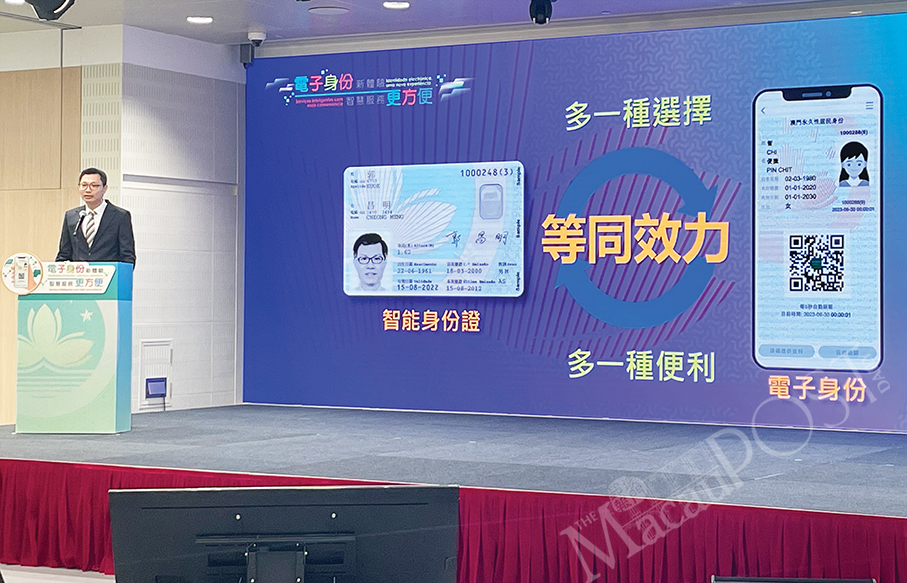Identification Services Bureau (DSI) Director Chao Wai Ieng announced yesterday that with the launching of the e-ID function in the Macao One Account today, 744,000 local residents, in the first phase, can use their e-ID certificate for public services including counter services, cross-border travel and document enquiries, while services provided by the private sector cover the online booking for Home Return Permits (回鄉證), as well as the services of financial institutions and telecommunications companies.
A Home Return Permit is officially known as Mainland Travel Permit for Hong Kong and Macau Residents.
In addition, according to Chao, residents will be able to use their medical e-vouchers with their e-ID certificate at medical institutions from August, while course enrolments and sign-ins with an e-ID certificate under the government's continuing education subsidy scheme will be available from September.
Chao made the remarks during a joint press conference in conjunction with the Public Administration and Civil Service Bureau (SAFP) and Public Security Police (PSP) at the China-Portuguese-speaking Countries Commercial and Trade Service Platform Complex in Nam Van, commonly known as Forum Macao.
Chao underlined that an e-ID certificate has the same legal effect as a physical ID card and, therefore, residents can choose either to use their physical ID card or e-ID certificate in the Macao One Account in their daily lives.
The e-ID certificate will be consistent with the information on the next generation of smart ID cards to be launched on October 15, including the category of resident identity, ID card number, name, gender, photo, date of birth, date of issue and expiry date, according to Chao, who noted that the e-ID certificate, which will be equipped with an encrypted QR code, has been designed with five anti-counterfeiting features, i.e., dynamic lines, a watermark and an encrypted two-dimensional code that will be refreshed on a regular basis in real time, with the ID card number and date shown on the e-certificate to be constantly updated and moved.
Chao said in a speech that the e-ID certificate will be used as an auxiliary physical ID card application for all Macau residents, whose ID card information can be uploaded to their Macao One Account once their identity has been authenticated by face recognition. Chao noted that the e-certificate represents the important development process of Macau residents’ e-identity and that his bureau will continue to further expand the application scope and service field of "electronic identity" to provide the general public and businesses with better facilities, promoting the integration of smart government into people's daily lives and contributing to the construction and the development of Macau as a smart city.
When asked by a reporter how to protect e-ID data from being leaked, Chao said after the press conference that all residents’ personal data is protected by the local personal information protection law, adding that whenever a government entity applies for data interconnection of an electronic identity, his bureau will examine the legitimacy, necessity and appropriateness of the entity's request for information, and provide the information only when it complies with the law, technology and security.
Chao underlined that special technology has been adopted on the e-ID certificate, which will not be affected by the operation and maintenance of the network and cloud platform, ensuring the smooth use of the function.
Meanwhile, PSP Deputy Commissioner Ng Sou Peng announced after the press conference that from today, residents’ respective e-ID certificates will be applicable for cross-border travel, crime reporting, and the police forces’ counter services, subject to compliance with the law.
Although an e-ID certificate can be presented to the police during the checking of identification documents, Ng said that considering that it will be sometimes impossible to generate an e-ID certificate in the Macao One Account due to a mobile phone network failure, it would be advisable for residents to always carry a physical ID card when going out as the e-ID certificate is only meant as an auxiliary use of the physical one.
Meanwhile, SAFP Deputy Director Ng Wai Han said during the press conference that the e-ID certificate will be available for 184 double gates at six border checkpoints, comprising the Barrier Gate, Hong Kong-Zhuhai-Macau Bridge (HZMB) checkpoint, Outer Harbour Ferry Terminal in Zape, the airport in Taipa, the Taipa Ferry Terminal, and the Inner Harbour Ferry Terminal.

Identification Services Bureau (DSI) Director Chao Wai Ieng gives a briefing on the use of the brand-new e-ID certificate, a new function in the Macao One Account, during yesterday’s press conference at the China-Portuguese-speaking Countries Commercial and Trade Service Platform Complex in Nam Van. – Photo: Yuki Lei









